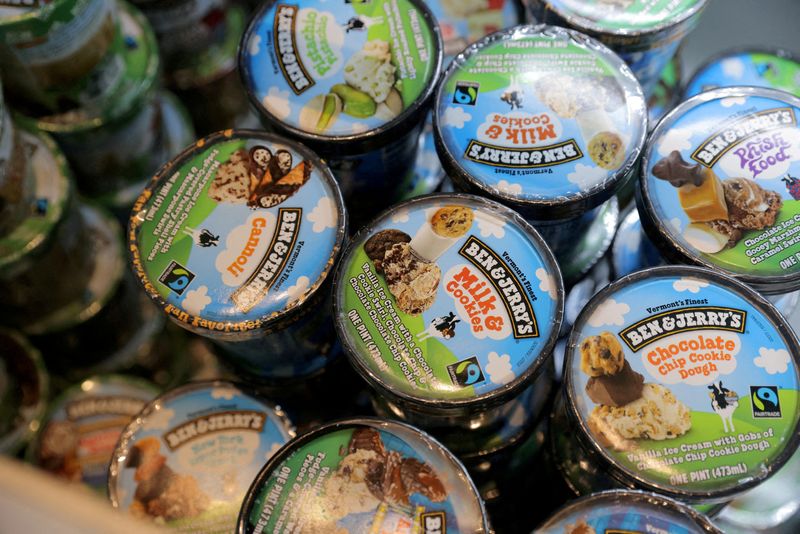By Richa Naidu and Ross Kerber
LONDON/BOSTON (Reuters) - Ben & Jerry's legal battle with Unilever (NYSE:UL) sheds light on an issue affecting a growing number of purpose-led brands: how to maintain their identity after being bought by a major consumer company.
Multinational consumer groups have raced to snap up socially conscious brands in recent years, seeking to tap into a surge in demand among customers for ethical products, usually sold at a premium.
Under Chief Executive Alan Jope, Unilever has added to a portfolio of "purposeful" brands - from Paula's Choice skincare products that shun animal testing to sustainably-made supplements from SmartyPants and Nutrafol.
In 2000, the company scooped up Ben & Jerry's for $326 million with an unusual caveat: the Vermont-based ice cream maker would retain its independent board of directors, responsible for guiding its social and political identity.
Ben & Jerry's now believes that commitment to have been breached, following a furore over its plan to stop selling ice creams in the Israeli-occupied West Bank that eventually led Unilever to strike a deal to sell the brand's Israeli business.
The maker of Chunky Monkey and Cherry Garcia ice creams sued its parent company on July 5 to try to stop the sale. A ruling is expected in the coming weeks.
"It's a wake-up call for the folks who do deals to be more vigilant and ensure not only do the financials support a deal, but the underlying potential future conflicts are free and clear," said Mark Cohen, a professor at Columbia University Business School.
Unilever declined to comment for this story. Ben & Jerry's had no immediate comment.
Ben & Jerry's, now worth over 1 billion euros ($1 billion), says the Israeli sale is against its values by allowing its products to remain available in the West Bank.
The ice cream brand should have been aware that "Unilever might see fit to put the Ben and Jerry's brand anywhere and everywhere in the world," Cohen said.
On the other hand, Unilever should have understood Ben & Jerry's founders "have taken a political stance on a variety of issues, not the least of which being their objection to the actions of the State of Israel," he added.
Unilever may have already learned the lesson. Home products brand Seventh Generation, which it bought in 2016, created a "social mission" board meant to keep the business focused on causes such as diversity and generating less packaging waste.
But the messaging on the brand's website and Twitter (NYSE:TWTR) feed covers a narrower range of issues than that of Ben & Jerry's.
"Seventh Generation has a broad mission for environmental, racial and social justice. Ben & Jerry's mission may be broader," said Mindy Lubber, CEO of climate advocacy group Ceres and a member of the Seventh Generation board until this year.
'CONSIDER WHAT YOU'RE GIVING UP'
Organic food company investor Gary Hirshberg, who co-founded yogurt brand Stonyfield, now part of French dairy group Lactalis, said entrepreneurs cannot rely on a publicly-traded buyer to continue a social mission because the new owner's executives will come and go. He called the Ben & Jerry's dispute with Unilever "a classic difference in the cultures."
But he added a good way to protect a brand's mission was to build it around a legal standard like having organic ingredients, hard for a buyer to change.
Oregon Treasurer Tobias Read, who oversees state pension fund investments worth about $100 billion including Unilever shares, said the Ben & Jerry's dispute shows how socially-minded businesses can have contrasting obligations once they become part of a publicly-listed company.
"If you're a founder and you're considering being acquired, you might want to consider what you're giving up," Read said.
Family-owned outdoor apparel and gear maker Patagonia values having oversight over decision making.
"Many of our boldest moves have been enabled by our independence," said Matthijs Visch, its general manager for Europe, the Middle East and Africa.
"Today, the argument 'We can't do that because we have shareholders' simply doesn't hold water."
Concerns that ethical principles could be compromised after a buyout have held some companies back from agreeing deals.
British beauty brand Lush markets its bath 'bombs' and soaps as vegetarian, cruelty free and handmade. The firm's staff hold 10% of its shares and have a say in how the business is run.
That independence will not be given up, no matter how attractive an offer might be, said ethics director Hilary Jones.

"External capital would not find us an attractive partner, and we would not relish having financial returns being the main goal and restricting our choices, so we have deliberately resisted taking outside investment," she said. "We love what we do and we love to do it our way."
($1 = 0.9823 euros)